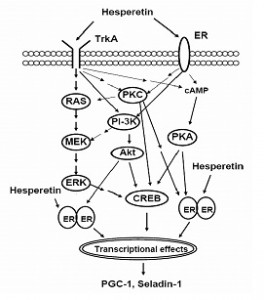 The mechanism of pro-cellular survival and neuroprotective actions of hesperetin in PC12 cells has been elucidated by Gow-Chin Yen and co-workers in Taiwan.
The mechanism of pro-cellular survival and neuroprotective actions of hesperetin in PC12 cells has been elucidated by Gow-Chin Yen and co-workers in Taiwan.
Hesperidin is one of the most abundant flavonoids found in citrus fruits, in particular oranges, tangerines and lemons. Although only a moderate anti-oxidant, studies have demonstrated that hesperetin protects neural cells against oxidative damage. Previous work by the Taiwanese team has demonstrated that hesperetin acts more as a signalling modulator than an antioxidant and protects against oxidative stress via estrogen recptor (ER) and tyrosine kinase receptor A (TrkA) mediated actions.
In this study the team investigate the more detailed hesperetin-triggered signalling pathways revealing that the parallel pathways collaborate to induce proteins regulated by different transcriptional factors. The elucidation of this novel mechanism explains why hesperetin, although possessing relatively low antioxidant and estrogen activities, can exhibit multiple neuroprotective effects.
Interested in knowing more details? Read the article in full for free until 10th August.
Pro-cellular survival and neuroprotection of citrus flavonoid: the actions of hesperetin in PC12 cells
Sam-Long Hwang, Jer-An Lin, Ping-Hsiao Shih, Chi-Tai Yeh and Gow-Chin Yen
Food Funct., 2012, Advance Article, DOI: 10.1039/C2FO30100H
You may also be interested in this review which is also free to access
Anti-inflammatory activity of natural dietary flavonoids, Min-Hsiung Pan, Ching-Shu Lai and Chi-Tang Ho
Food Funct., 2010,1, 15-31, DOI: 10.1039/C0FO00103A
You can keep up to date with the latest developments from Food & Function by signing up for free table of contents alerts and monthly e-newsletters.










